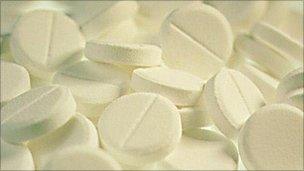Heart patients told 'stay on aspirin'
- Published

Daily aspirin can help prevent blood clots
Heart disease patients are being urged to keep taking aspirin after a study has found stopping the drug raises heart attack risk by nearly two-thirds.
Against medical advice, up to half of long-term users are believed to stop taking aspirin, researchers say in the British Medical Journal, external.
And this puts them at a 60% greater risk of a non-fatal heart attack.
The findings come from a UK database of nearly 40,000 patients who had been prescribed the drug by their doctor.
For every 1,000 patients over a one-year period, there were about four extra cases of non-fatal heart attack among patients who recently stopped taking low-dose aspirin compared with those who stayed on it.
Low-dose aspirin is recommended for all heart disease patients to help prevent blood clots which can lead to future heart attacks.
Ellen Mason, of the British Heart Foundation, said: "This research is yet another reminder of how effective a little daily pill of aspirin can be at preventing someone from having another heart attack. So it's very concerning how many people with heart disease are not taking their aspirin.
"This very cheap, but valuable, golden oldie is one of the best researched drugs we have in our arsenal to stop further heart attacks. The benefits certainly outweigh any risks for most people.
"If you've had a heart attack then stopping taking your aspirin increases your risk of having another heart attack and this can result in permanent damage to your heart. Don't simply stop taking your meds, always talk to your doctor first."
- Published7 December 2010